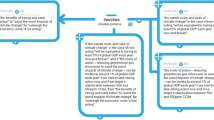Abstract
The paper discusses intention as a rhetorical key term and argues that a consideration of rhetor’s intent should be maintained as relevant to both the production and critique of rhetorical discourse. It is argued that the fact that the critic usually has little or no access to the rhetor’s mind does not render intention an irrelevant factor. Rather than allowing methodological difficulties to constrain critical inquiry, I suggest some ways in which the critic can incorporate the rhetor’s intention in evaluating argumentation. To this end, a standard of fairness is presented.
Similar content being viewed by others
References
Booth W. C. 2004, The Rhetoric of Rhetoric: The Quest for Effective Communication. Blackwell, New York
Booth W. C. 2005, War Rhetoric, Defensible and Indefensible. Jac 25: 221–244
Condit C. M. 1997, In Praise of Eloquent Diversity: Gender and Rhetoric as Public Persuasion. Women’s Studies in Communication 20: 91–116
van Eemeren F. H., Grootendorst R. 1992, Argumentation, Communication, and Fallacies. A Pragma-Dialectical Perspective. Lawrence Erlbaum Associates, Hillsdale
van Eemeren F. H. et al. 1996, Fundamentals of Argumentation Theory: A Handbook of Historical Backgrounds and Contemporary Developments. Lawrence Erlbaum Associates, Mahwah
Foght Mikkelsen J. 2002, Formidlingsetik. Bidrag til en etik om strategisk kommunikation. Roskilde Universitetsforlag, Frederiksberg
Foss S. K., Griffin C.L. 1995, Beyond Persuasion: A Proposal for an Invitational Rhetoric. Communication Monographs 62: 2–18
Foss S. K., Griffin C. L., Foss K.A. 1997, Transforming Rhetoric through Feminist Reconstruction: A Response to the Gender Diversity Perspective. Women’s Studies in Communication 20: 117–135
Fulkerson R. 1996, Transcending our Conception of Argument in Light of Feminist Critiques. Argumentation and Advocacy 32:199–217
Gearhart S. M. 1979, The Womanization of Rhetoric. Women’s Studies International Quarterly 2: 195–201
Goodnight G. T. 1993, A “New Rhetoric” for a “New Dialectic”: Prolegomena to a Responsible Public Argument. Argumentation 7: 329–342
Herrick, J. A.: 1998 [1997], The History and Theory of Rhetoric. An Introduction, Allyn and Bacon, Boston
Jørgensen, C.: 2000, ‹Hvem bestemmer hvad der er god retorik? Vurderingsinstanser i normativ retorik’, Rhetorica Scandinavica 15, 34–48
Jørgensen, C. and Onsberg M. 1999 [1987], Praktisk Argumentation, Teknisk Forlag, Copenhagen
Kennedy G. A. 1991, Aristotle on Rhetoric. A Theory of Civic Discourse. Oxford University Press, New York
Perelman C., Olbrechts-Tyteca L. 1969, The New Rhetoric. A Treatise on Argumentation. University of Notre Dame Press, Notre Dame
Perelman C. 1984, The New Rhetoric and the Rhetoricians: Remembrances and Comments. Quarterly Journal of Speech 70: 188–196
Walton D. 1995, A Pragmatic Theory of Fallacy. The University of Alabama Press, Tuscaloosa
Author information
Authors and Affiliations
Corresponding author
Rights and permissions
About this article
Cite this article
Jørgensen, C. The Relevance of Intention in Argument Evaluation. Argumentation 21, 165–174 (2007). https://doi.org/10.1007/s10503-007-9044-0
Received:
Accepted:
Published:
Issue Date:
DOI: https://doi.org/10.1007/s10503-007-9044-0




